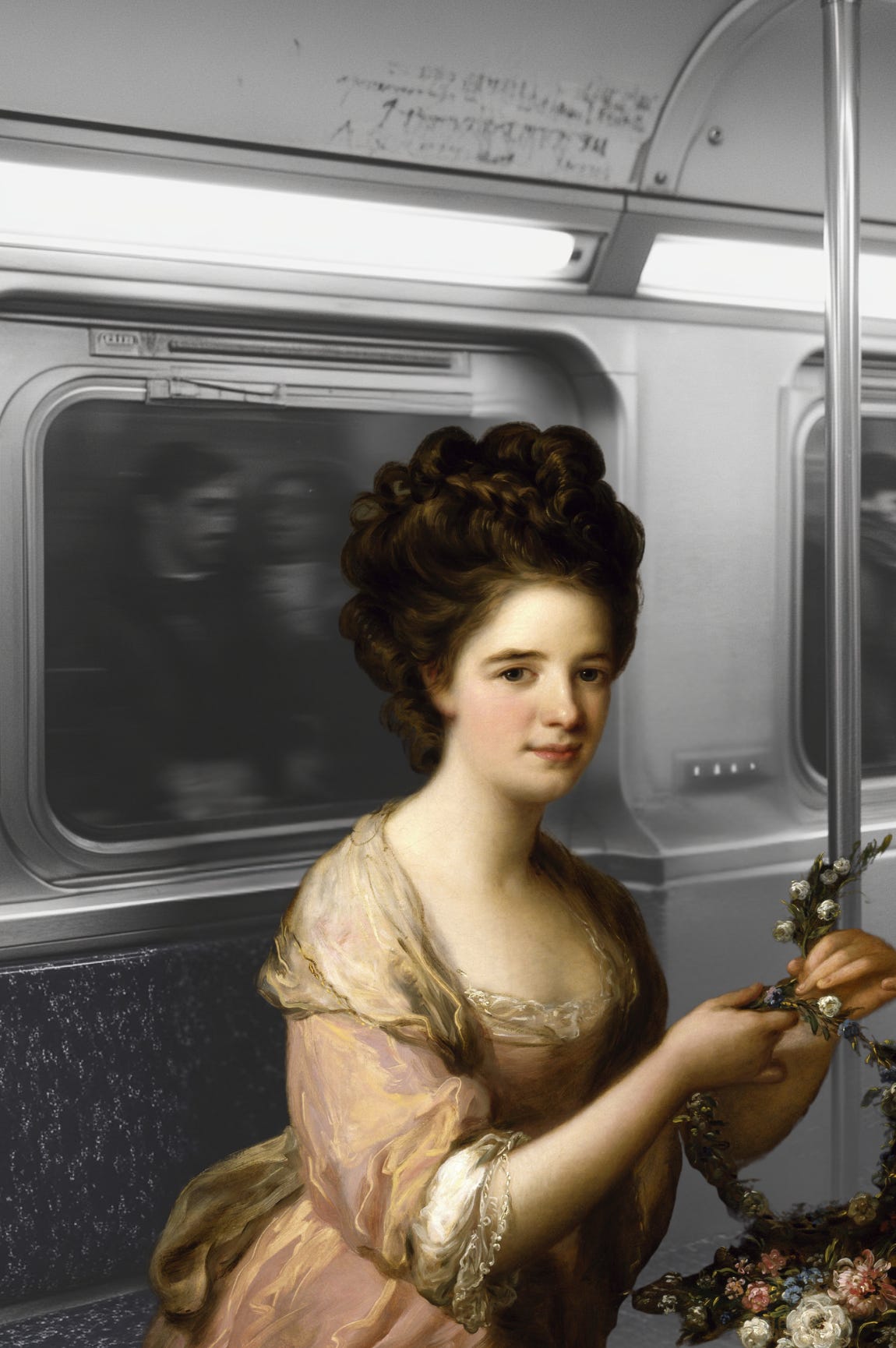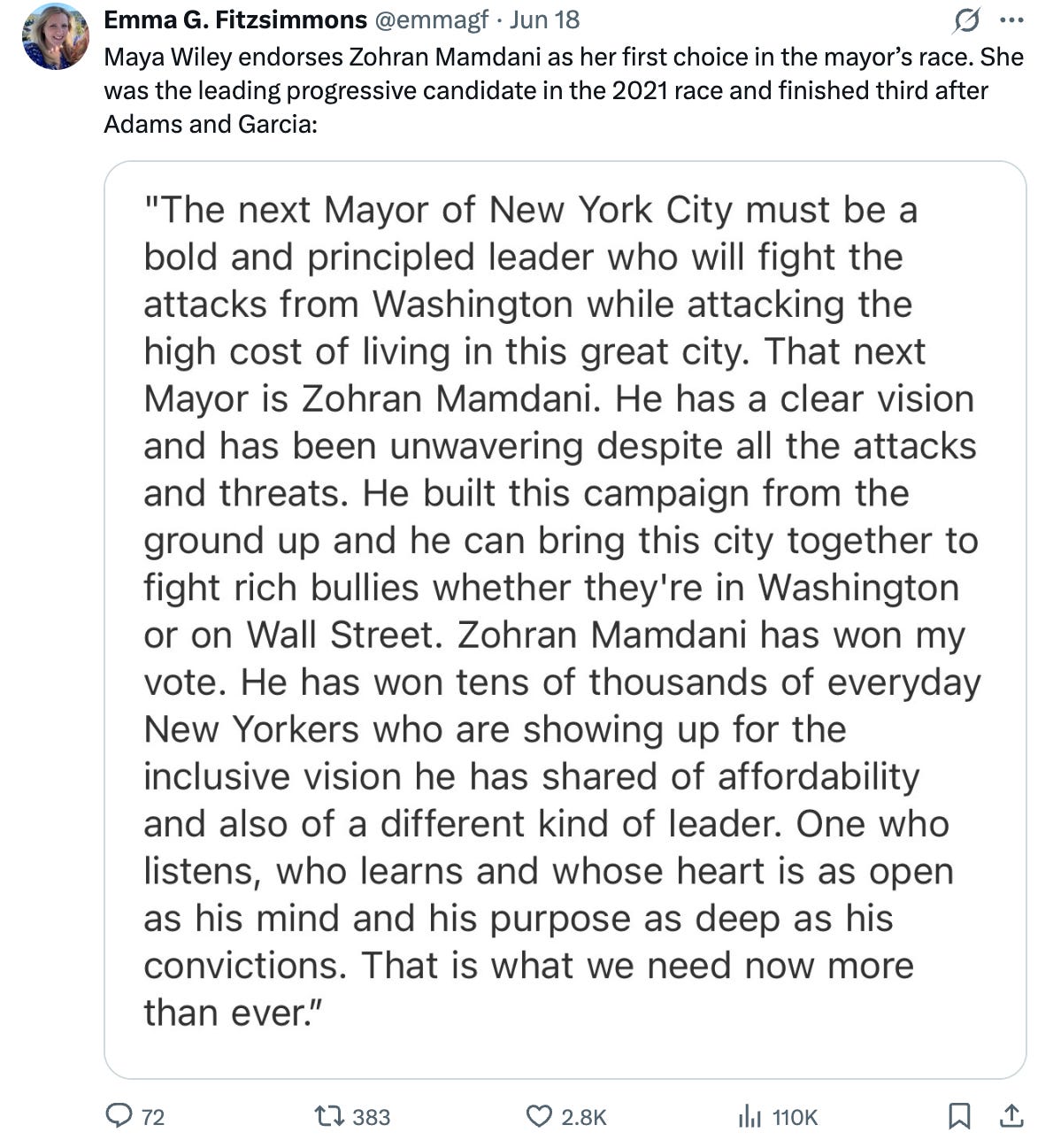is New York City ok??? are they gonna make it??
thoughts on eating the rich and starving the city

There’s a new guy running for mayor of New York City, and he thinks your local bodega should be a government agency. This is not satire.
Zohran Mamdani—a 33-year-old democratic socialist and self-described “poet of the people”—just won the Democratic primary in NYC, toppling the party machine that once backed Cuomo and sending Eric Adams into a full-blown PR bender. Zohran has a theater degree and zero business experience, which is painfully obvious considering his platform reads like a freshman dorm brainstorm that nobody had the heart to veto:
State-run grocery stores
Free public transit
Rent freezes
Billionaire tax hikes
“Food justice,” “climate equity,” and other phrases that feel like they were auto-generated by a gender studies thesis simulator
The crown jewel? A plan to open five city-owned grocery stores, one in each borough.
Not subsidies. Not vouchers. Literal, city-owned supermarkets. One per borough. No rent, no profit, no competition. Just a bureaucratic food distribution system dreamed up by a guy who’s never met a supply chain in his life and administered by the same bureaucracy that brought you potholes, moldy school lunches, and 11-month waitlists for public housing repairs. Central planning, no skin in the game, zero market signals. A five-borough Soviet Safeway run by interns and ideology.
It’s not communism, technically. Mamdani is a democratic socialist. Which means, in theory, he wants to seize the means of production—but only after you vote yes on it. The aesthetic is less gulag, more TikTok mutual aid. More centralized control, less market interference—all dressed up in participatory language and Instagram slideshows. I don’t know why I’m shocked so many people are gobbling it all up.

This is what happens when you let people who’ve never built anything start redesigning entire systems. They confuse commerce with cruelty and think “solving capitalism” means replacing efficiency with slogans.
Because capitalism doesn’t just work—it forces things to work. It rewards competence. It punishes waste. It scales what people actually want, instead of what a city council committee thinks people should eat.
Supporters are calling it a moral corrective to food deserts and corporate consolidation. Critics are calling it f*cking insane.
Can a government that can’t keep the subway rats out of pizza slices really run a five-borough grocery empire? (No.)
But the scariest part isn’t the policy. It’s the optics of sincerity. Mamdani speaks like someone who truly believes the problem with food in New York is not enough bureaucracy.
And in a city where corner stores are already cultural institutions—run with the grit, improvisation, and hustle that defines New York—it’s hard not to wonder what we lose when we try to central-plan character.
(If you’re new here and surprised I’m defending capitalism, you might want to read the big, dirty C-word—it’ll save us all some confusion.)
who is Zohran Mamdani, really?
This isn’t some scrappy working-class hero rising up through the ranks. Zohran Mamdani is the son of a famous intellectual (Mahmood Mamdani) and acclaimed filmmaker (Mira Nair). He went to Bowdoin, majored in theater, and spent much of his early adulthood in elite cultural and activist circles. Which is fine, until he started cosplaying as a grassroots revolutionary.
There’s a certain genre of politician that emerges from these spaces. They speak in the language of struggle, but their lived experience is entirely insulated from the policies they propose. Mamdani has no record of building businesses, managing systems, or doing the kind of ground-level work required to understand operational complexity. But he’s fluent in slogans, and in today’s political culture, that’s increasingly enough.
He doesn’t speak to New York’s working class. He speaks on their behalf, often from a place of distance so wide it might as well be generational. And that’s the real tell: Mamdani’s brand of socialism isn’t about empowering people. It’s about managing them. The grocery store is just the beginning.
but let’s talk about the actual platform:
City-owned grocery stores sound like a cute public sector experiment until you realize what that actually entails: labor unions, procurement hell, food safety bureaucracy, transportation logistics, and a rotating cast of managers protected by layers of bureaucracy, insulated from consequence—because when profit disappears, so does performance incentive. Profit is not the problem—it’s the signal. Remove that signal, and you remove the pressure to keep shelves stocked, prices competitive, and customers satisfied.
Rent freezes don’t help renters. They kill development. When investors know they can’t raise rent, they stop building housing. That’s how you get shortages. That’s how you get black market subleases, deteriorating units, and middle-class flight.
Free public transit? Great—until fare revenue dries up, maintenance gets deferred, and no one feels safe riding it. Just ask San Francisco.
Tax hikes on billionaires and corporations? Who’s going to stay? The people who can’t leave—which means the ones who pay for these fantasy programs are the people least able to afford it.
What Mamdani offers isn’t a plan. It’s a worldview. And at its core is a belief that market signals are morally suspicious, and that if you centralize enough power, you can replace trade-offs with cute little slogans.
the cult of optics —
Mamdani is a case study in aesthetic governance. Everything is symbolic. Every policy is a metaphor. His campaign isn’t selling functionality—it’s selling moral alignment. That’s why it appeals to people who are too ideologically captured to realize they’re cheering for their own decline. People who think good intentions can replace functioning systems—because they’ve never had to run anything themselves.
There’s a strain of progressive politics that treats government like a stage. Performance becomes policy. The vibe becomes the verdict. You see this most clearly in how failure gets rebranded: when something doesn’t work, it’s not because it was a bad idea. It’s because it wasn’t supported enough. Not funded enough. Not given enough control.
The logic becomes circular. Every flaw is a case for more intervention. Every breakdown is evidence the system isn’t centralized enough. It never stops. And Mamdani speaks this language fluently.
the Cynthia Nixon problem —
You can’t understand Mamdani’s rise without understanding the ecosystem that enables it. It’s not just broke college kids and activist NGOs. It’s actors, producers, tenured academics, and brownstone socialists who fantasize about worker-led revolutions from their multimillion-dollar real estate holdings.
Cynthia Nixon—net worth in the millions, Fort Greene brownstone, HBO residuals rolling in—is one of Mamdani’s most vocal boosters. It would be funny if it weren’t so corrosive. Because while she performs solidarity, the cost of these policies fall hardest on the very people she claims to represent: the small business owners. The landlords trying to stay afloat. The working-class families who don’t get chauffeured to climate rallies or have publicists to massage their rhetoric.
This is what makes Mamdani dangerous. Not just the ideas—the permission structure around him. He has the backing of people who will never feel the pain. And that’s the part no one wants to say out loud: these ideas are subsidized by wealth. The system absorbs the dysfunction at the bottom while the elite applaud it from safe distances.

who pays for the “revolution”?
Not the Cynthia Nixons. Not the nonprofit crowd. Not the Columbia sociology department. The people who pay are the ones who don’t have the luxury to fail upward: immigrants trying to run cash businesses, middle-income families just above the cutoff for assistance, small landlords trying to make mortgage in rent-controlled buildings, and every restaurant owner trying to survive a regulatory maze with shrinking margins.
These are the people who actually make New York work—not because they say the right things, but because they show up, take risk, and stay accountable to reality. They don’t get bailouts. They don’t get glowing New Yorker profiles. They get told they’re greedy for wanting to earn a return.
For small landlords, bodegas, and family-run shops, complexity isn’t just annoying—it’s existential. Every added regulation, every new licensing step, every bureaucratic delay chips away at already-thin margins. And unlike the nonprofits and cultural institutions backing Mamdani, these people don’t have grant writers or legal teams. If the system becomes unworkable, they can’t lobby their way out. They just close up shop and disappear.
the collapse of competence —
Mamdani’s platform isn’t just bad policy. It represents a broader breakdown of seriousness. Governance used to be about balancing trade-offs, solving constraints, managing limited resources. Now it’s about vibes. And New York, once a capital of practical ingenuity, is turning into a test kitchen for utopian slogans with no supply chain.
The problem isn’t that Mamdani is radical. The problem is that he’s unserious. The proposals are abstracted from cost, logistics, and consequence. They’re not built to function—they’re built to trend.
And that’s what makes this moment dangerous. Because cities don’t run on narratives. They run on incentives. On margins. On time. On execution. You don’t get to manifest your way to a functioning transit system or a stocked grocery shelves.
the logic of consequence —
Eric Adams—flawed as he is—is now running as an independent with backing from Wall Street, hedge funds, and anyone who understands that when you mess with the food supply, it’s not long before everything else breaks. Adams blasted Mamdani’s platform as “reckless and unserious.”
And he’s right. Because what’s being offered isn’t a food policy. It’s a worldview that sees capitalism as the root of all injustice, and bureaucracy as the only path to virtue. It’s a deeply unserious, deeply elite idea that gets cosplayed as revolution—but functions as control.
Meanwhile, Mamdani’s campaign dropped a line that might be the most unintentionally revealing thing I’ve read all year:
“This is about replacing the logic of profit with the logic of care.”
But systems don’t run on care. They run on clarity. Feedback. Accountability.
Profit isn’t the problem. It’s the proof.
You can have a grocery store run by someone who needs profit to survive…
Or you can have one run by someone who thinks profit is violence.
One stocks the shelves. The other drafts press releases.
We’ve seen this movie before—and it definitely doesn’t end with better groceries.
Mamdani’s not building a food system. He’s building a narrative. One where the optics matter more than the outcome—and where failure can always be blamed on capitalism anyway.
The question isn’t whether Mamdani’s ideas will fail. They will.
The question is how much damage gets done before voters realize it.
A society that punishes success and subsidizes incompetence won’t just lose its businesses. It will lose its backbone.
Capitalism has flaws. But it has one massive advantage: it has to answer to reality.
And that’s the one thing no amount of narrative can replace.
I really hope they make it. I’m rooting for them.
XO, STEPF
MORE FROM WILD BARE THOUGHTS ❤️🔥
be a Leonardo: the art of unfinished things
I had this shower thought the other day—you know, the kind that arrives uninvited while you're standing there with shampoo in your hair, suddenly making you question everything you thought you knew a…
machine yearning
After I published my essay on self-pursuit last month, I started receiving lots of messages from people who wanted to know the practical mechanics of it all. I'd mentioned in passing that I use AI for daily journaling, calling it












Wait--did you say "capitalism has to answer to reality?" In what universe? In American capitalism a handful of millionaires and billionaires get bailed out again and again (golden parachute, anyone?) while millions of people go hungry and die of preventable diseases. In reality, no one needs multiple mansions or yachts or $5,000 cashmere sweaters and everyone needs to eat. I haven't made up my mind yet about Mamdani, but your argument is wildly unconvincing, barely humane, and thoughtlessly unmoved by how systems actually work and affect human behavior. Capitalism is not an individual choice and neither is its antidote. It's a compulsory system that can't be hacked by shopping at thrift stores. It is literally the government's job to make sure people don't go hungry. Considering how many people do go hungry in the current system, I'm willing to at least entertain the possibility of state-run grocery stores, etc.
Why stop at grocery stores? New York needs public brothels. Young nubile woman have an abundance of sexiness and soft flesh that they could be sharing with those in need. The need is tremendous. Don't worry, the young women will be fairly compensated based upon what a committee of their fellow citizens deems is fair. Don't be a bigot, support public brothels to ensure an equal distribution of happiness.